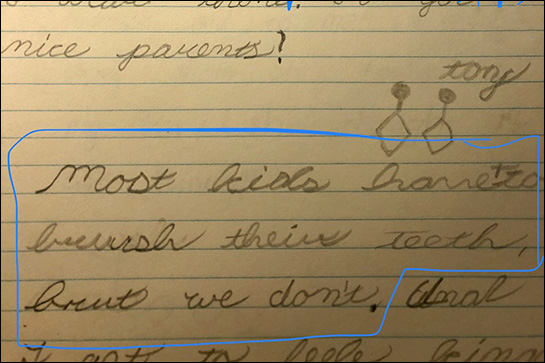This is a plan for kids who want to skip college and get a job writing code

I’m a big fan of the idea of skipping college. Most kids don’t need to go. You don’t need to write ten-page papers on pedantic topics. And you don’t need to get grades and a transcript in order to be a lifelong learner. (Here is me hating college—on CNN. In 2013. I’ve been saying this forever.)
Skipping college makes sense for a lot of kids, but you need to plan what you’ll do instead. You can change the plan—most people end up changing their plans because there are no fail-safe plans. Just make the best plan for right now.
Skipping college works best if you’re fast. You can get four years of work onto your resume while other people are in school. That’s important to do because you don’t want to be the same age as college graduates competing as a non-graduate. The higher up you are from entry-level by the time you are 21, the easier it’ll be to compete with college graduates.
Get brand name companies on your resume. Companies will become your pedigree in place of a college name. And the duration that you stay at the company will determine if it looks like you’re treating this as a real job (1-year duration minimum) or a frivolous, kid project (short summer stint).
Set very clear goals. Where are you headed? Then work backward. For example, one goal you could have is that to be in a mid-level job at a good company by age 21. That way you are done competing with college kids by the time your peers graduate.
So then you work backward.
At age 21 need to be promoted to a mid-level job at good company
At age 20 need to be at an entry-level job at good company
At age 19 need to be at a job that will get you to a good company
At age 18 need to complete learning the code you need to launch this plan
Pick a good code camp. The best coding boot camp will have a reputation that will ensure you get a job when you complete the training. Also, keep in mind that the name of the boot camp will be at the bottom of your resume for a while, in the education section.
Pick the location carefully. The city where you attend camp will be the city where you build your network. When it comes to jobs, most people move to a big city to start their career so they have lots of opportunities. Smaller cities are good for keeping family expenses low, but not as good for trying out a lot of different types of jobs early in your career.
Pay heed. Boeing reports that some of the engineers working on their crappy planes that crashed three times were making $9/hr. This means that engineering is slipping into the abyss of jobs that previously paid a lot and now do not. So be aware that no plan is safe, and you always need to be thinking ahead to what you’ll do when your job skills are outdated.



I agree it’s necessary to set very clear goals. A mid-level job at a good company by age 21 may be a stretch, though. I think it’s more important to have a good foundation of working experience on meaningful and measurable projects where achievements can be cited and recognized by other professionals. I’d also be looking for a company willing to invest in my future with relevant training and courses with the objective of future advancement.
I don’t think the last paragraph citing Boeing and engineering is a good example of paying heed. Boeing is the company who should have been/be paying heed for making the mistake of tasking unqualified people with their engineering work. At the very least, Boeing should have had that work double and triple checked by senior experienced engineers.
A good, current and long term in-demand computer skill is cybersecurity. I’d recommend a two-year associates degree as a minimum to start. Maybe earn it or go a long ways towards earning it by taking classes in a community college before turning 18. Get a job in the field and then have the employer pay for classes to complete a four-year degree. It doesn’t avoid college but then it doesn’t take you out of the workforce like a conventional 4-year college degree.
Penelope, you have been saying kids don’t need to go to college for many years. I’ll add another well-written post you wrote in 2013 on your career blog here – http://blog.penelopetrunk.com/2013/04/23/new-paths-to-a-great-job/ . That’s not the message many kids are getting from their parents, peers, or teachers though. The drumbeat is still you need some amount of college education to be successful. The people in business doing the hiring are perpetuating the importance of college. I think college is important for some professions but not as many that require it in their hiring practices. College has become so pervasive and such a crutch in young people’s lives that they have now started offering “adulting” courses to teach valuable life skills. And they’re doing it at high college course rates. I don’t agree with everything you write but a good share of it and enough to keep reading.
This is the best post you’ve written on why not to go to college, because it’s the one where you’ve been most clear on what to do instead, why to do it, and how to do it. And you managed to keep it so short too! Really excellent.
I’m in I.T. I was a contractor for most of my career so I’ve worked in a lot of places. I have no idea who hires people that go to coding boot camps but certainly not any company I’ve ever worked for. We don’t hire anyone based on what coding language they know. Being a programmer in this day and age is a much larger skill than coding. Plus we increasingly hire on soft skills like writing and communication. We’ve ever hired someone who wasn’t in or graduated from college. Like it or not, a college degree sets a minimum bar for certain valuable skills.I was in a leadership training event this week and we were discussing some performance issues and most of them centered around writing. Those term papers have more value than you think.
Shh! Don’t tell everyone!
My soft skills in writing and communication made for a pretty good career for me. Proving you can complete things, like say a BA, MA, and PhD, says something about you too. I moved into an international business career right out of my irrelevant PhD, starting at a salary that would be 115K in today’s dollars, and more than doubling that within two years. The communication difficulties of engineers laid the table for me.
Like it or not, the days when you could work your way up from the mailroom are gone. You need a degree to get in the door, because any company can find a hundred people with skills as good as yours plus a degree. If you can’t finish a college degree, ask yourself why and fix that problem, because it would likely prevent you from being effective at work as well, even if you could make the first cut.
There are fields where it’s not important to have a college degree – those are the fields where almost nobody has a degree. If you’re the head of some small business that doesn’t require any academic credibility (i.e. a nail salon or a building contractor, but not a consultancy or a tutoring service), then you’ll only need college if your business gets big enough that you need to understand not just accounting but finance. But if you want to work for a company, ask yourself why they would hire you rather than someone just as good as you but with a degree.
Just because anybody has poor writing skills so he cannot say writing papers is stupid or writing is nothing but a waste of time. I got your point exactly. You experience hurdles while writing your assignment papers and that is acceptable. Anybody can experience this issue. In fact, I was a poor writer in my all academic period but there are solutions available in the market. You can get references online even you can get proper guides about your topics. Just google it and there would be the best options for you. Go for it!